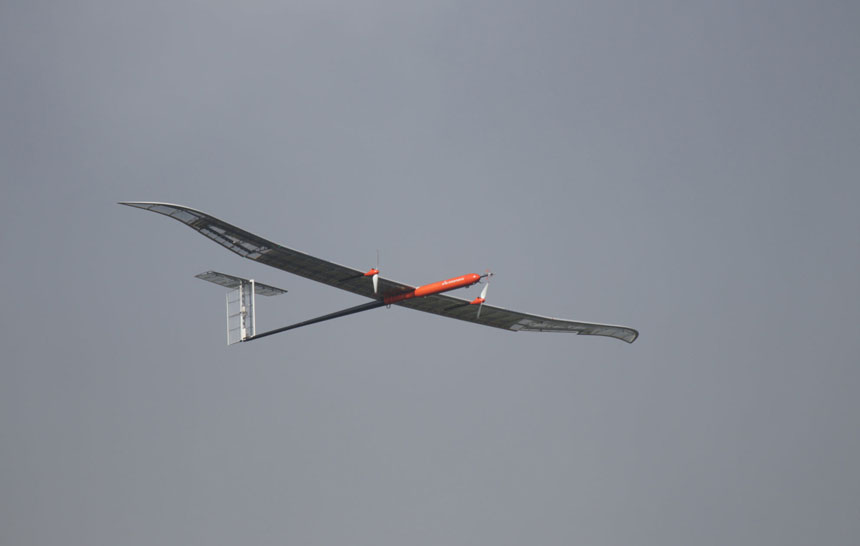Battery
LG Chem flew lithium-sulfur battery-loaded aircraft into the stratosphere.
By Sep 14, 2020 (Gmt+09:00)
1
Min read
Most Read
Samsung shifts to emergency mode with 6-day work week for executives


Alibaba eyes 1st investment in Korean e-commerce platform


Blackstone signs over $1 bn deal with MBK for 1st exit in Korea


NPS loses $1.2 bn in local stocks in Q1 on weak battery shares


OCI to invest up to $1.5 bn in MalaysiaŌĆÖs polysilicon plant


LG Chem Ltd. has completed a test flight of an unmanned plane at the highest altitude using its lithium-sulfur battery for the first time in South Korea.
The battery maker said last week that a small aircraft, dubbed EAV-3, successfully underwent a flight testing of about 13 hours in the stratosphere using the next-generation battery in Goheung, South Korea.
LG Chem loaded a lithium-sulfur battery on the EAV-3 and conducted the test-flight from 08:36 am to 09:47 pm on Aug. 30.
EAV-3 is a high-altitude long-endurance solar-powered unmanned vehicle developed by Korea Aerospace Research Institute. It can fly in the stratospheric altitude of 12km or higher using solar energy and batteries. It charges energy using a solar cell placed on the top of the wing. It has 20m-long wings and a 9m-long body.

ŌĆ£It confirmed a stable charge and discharge function of a lithium-sulfur battery in the extreme environment of the stratosphere with a low temperature of 70 degrees below zero and atmospheric pressure of 1/25 of one at ground level, which is close to a vacuum state,ŌĆØ LG Chem said in a statement on Sept. 10.
A lithium-sulfur battery is one of the next-generation batteries which will replace a lithium-ion battery and considered as a key component of the future transportation such as electronic cars, long-endurance drones and personal aircraft.
The energy density of the lithium-sulfur battery is 1.5 times higher than the existing lithium-ion battery because it uses lightweight materials such as sulfur and carbon compounds for anode materials and lithium metal for cathode materials.┬ĀIt is also price competitive compared to the lithium-ion battery as it does not use rare metals, LG Chem added.
LG Chem plans to mass-produce a lithium-sulfur battery that has an energy density more than twice that of the current lithium-ion battery after 2025.
Write to Man-su Chose at bebop@hankyung.com
The battery maker said last week that a small aircraft, dubbed EAV-3, successfully underwent a flight testing of about 13 hours in the stratosphere using the next-generation battery in Goheung, South Korea.
LG Chem loaded a lithium-sulfur battery on the EAV-3 and conducted the test-flight from 08:36 am to 09:47 pm on Aug. 30.
EAV-3 is a high-altitude long-endurance solar-powered unmanned vehicle developed by Korea Aerospace Research Institute. It can fly in the stratospheric altitude of 12km or higher using solar energy and batteries. It charges energy using a solar cell placed on the top of the wing. It has 20m-long wings and a 9m-long body.

ŌĆ£It confirmed a stable charge and discharge function of a lithium-sulfur battery in the extreme environment of the stratosphere with a low temperature of 70 degrees below zero and atmospheric pressure of 1/25 of one at ground level, which is close to a vacuum state,ŌĆØ LG Chem said in a statement on Sept. 10.
A lithium-sulfur battery is one of the next-generation batteries which will replace a lithium-ion battery and considered as a key component of the future transportation such as electronic cars, long-endurance drones and personal aircraft.
The energy density of the lithium-sulfur battery is 1.5 times higher than the existing lithium-ion battery because it uses lightweight materials such as sulfur and carbon compounds for anode materials and lithium metal for cathode materials.┬ĀIt is also price competitive compared to the lithium-ion battery as it does not use rare metals, LG Chem added.
LG Chem plans to mass-produce a lithium-sulfur battery that has an energy density more than twice that of the current lithium-ion battery after 2025.
Write to Man-su Chose at bebop@hankyung.com
Yeonhee Kim edited this article
More to Read
Comment 0
LOG IN







